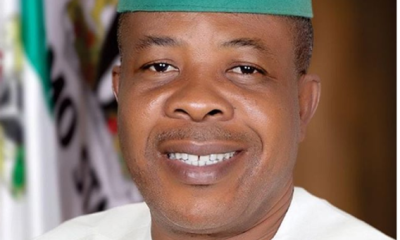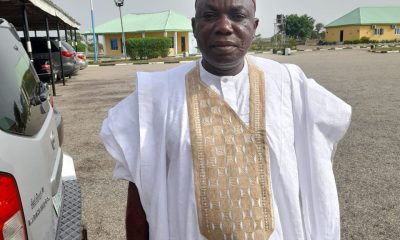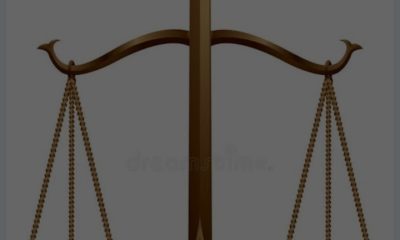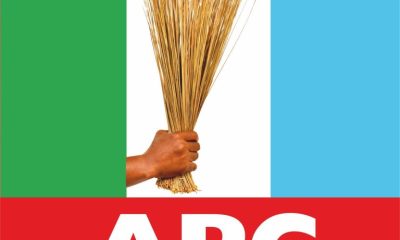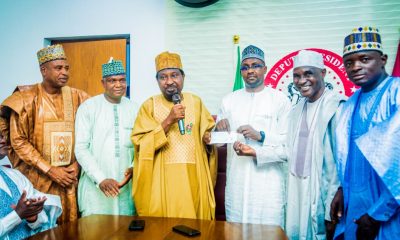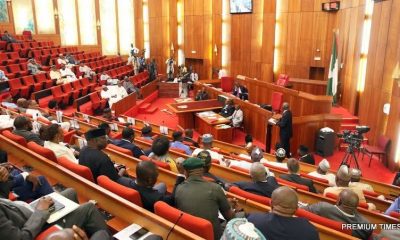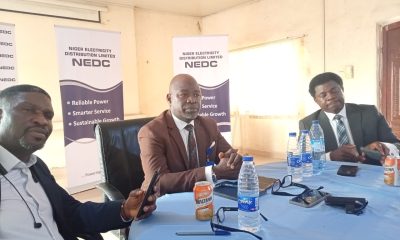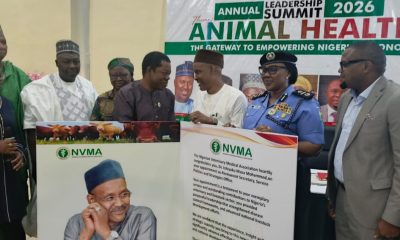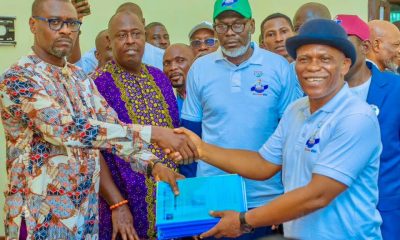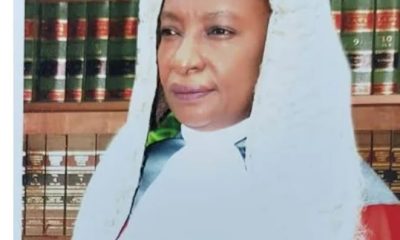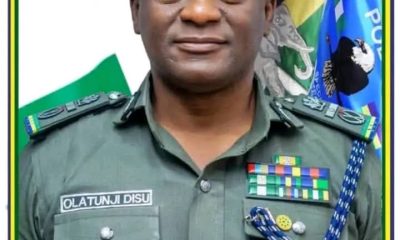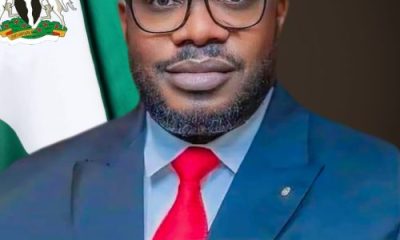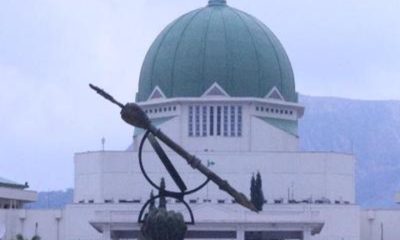Politics
MAHMOOD: A HUMANE ASSESSMENT
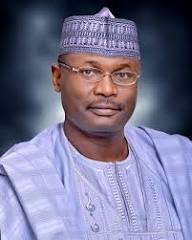
By: Emmanuel Nnadozie Onwubiko
“Be a good human being, a warm hearted, affectionate person. That is my fundamental belief.”
(-14th Dalai Lama)
“If you judge people, you have no time to love them.”
(-Mother Teresa)
Professor Mahmood Yakubu leaves the Independent National Electoral Commission after ten years at its helm; a decade that will be debated, dissected and, I suspect, ultimately judged kindly by history. President Bola Ahmed Tinubu has formally accepted Professor Yakubu’s departure and, in recognition of his service, conferred on him the national honour of Commander of the Order of the Niger. The handover to the most senior national commissioner, May Agbamuche-Mbu, marks the end of an era and the start of another fraught moment for Nigeria’s electoral architecture.
To assess Yakubu fairly we must do two things at once: catalogue the hard, demonstrable changes he put in place to modernise Nigeria’s elections, and then judge how those changes held up under the stress test of Nigeria’s deeply adversarial politics. On the first task (the one that will determine whether INEC is stronger on the morning after his exit than it was on the morning of his appointment), Yakubu’s record is substantial, concrete and, in many ways, transformative.
When Mahmood Yakubu arrived at INEC in November 2015, he inherited an electoral agency that had begun to recover public trust after the Attahiru Jega years. Over the next decade he pursued a program of institutionalising technology, stabilising processes and expanding access to the register; reforms that were not merely cosmetic but structural. The Bimodal Voter Accreditation System (BVAS) became a fixture at polling units; the machine records accredited voters, stores a picture of the EC8A (the polling unit result sheet) and was designed to reduce the kind of human tampering that has long hollowed out confidence in electoral outcomes. Complementing BVAS was the INEC Result Viewing portal (IReV); a public interface that allowed citizens, parties and observers to compare what was uploaded from polling units with what was being collated at state and national centres. Those two innovations (the biometric accreditation and the result-viewing portal), are not mere gadgets. They rewired the spine of the results chain and moved Nigeria from paper-only opacity toward a model of verifiable transmission.
Technology alone does not make an election free or credible; it makes verification possible. Yakubu’s INEC institutionalised procedures that, for the first time in decades, made it relatively easy for political actors and citizens to detect discrepancies between the result sheets at polling units and what appeared on official portals. This had a practical consequence: in the 2023 general elections several outcomes that would once have been unthinkable were validated on the ground and in the collation halls. The fact that results ran against the presumed preferences of political heavyweights (from presidential candidates to incumbent governors) is itself evidence that the mechanics of counting and transmission were functioning in ways that allowed voters’ choices to surface. Consider three state-level examples that mattered politically and symbolically.
In Lagos (the commercial hub that was, for decades, a political fief of Bola Tinubu), the Labour Party’s Peter Obi won the plurality of votes, a seismic outcome that spoke to the emergence of new urban coalitions and, importantly, to the ability of INEC’s systems to capture and publish polling unit returns for citizens and the media to scrutinise. That result, confirmed in the data and widely reported by credible international outlets, undercut the narrative that the commission could be bent to produce a foregone conclusion in even the most politically sensitive geographies.
In Osun State, the presidential tally favoured the Peoples Democratic Party’s candidate, an outcome that again cut across expectations and local party machines. And in the Federal Capital Territory, Abuja, the Labour Party’s dominance was decisive and visible on the result portals and official collations. These were not trivial or isolated quirks; they were systemic signs that votes were being counted and reported in ways that allowed the people’s will to be revealed, even when that will clashed with established power.
If one wishes to measure institutional independence by outcomes, look also to the rout of political heavyweights who assumed their influence could buy them seats. At least five outgoing governors who sought to move to the Senate after two terms were defeated by opponents; an outcome that would have been harder to engineer if the electoral market were rigged in favour of incumbency rent. The International Centre for Investigative Reporting recorded the defeats of prominent outgoing governors — Samuel Ortom (Benue), Ifeanyi Ugwuanyi (Enugu), Darius Ishaku (Taraba), Simon Lalong (Plateau) and Ben Ayade (Cross River) — and their losses were widely reported as evidence that the electorate and the electoral machinery combined to produce genuine upsets.
The list of losers includes not only governors but a string of sitting national assembly leaders and committee chairmen who were unseated; a political cleansing of sorts that reflected voters’ impatience and the capacity of the electoral process to enforce it. ICIR’s compilation of National Assembly members who lost their seats in 2023 reads like a catalogue of the vulnerable and the over-confident: minority leaders, long-standing committee chairs and seemingly secure incumbents found themselves out of office when results were tallied and verified. Those outcomes matter because they are measurable, verifiable instances where the electoral process functioned against the grain of personal power.
Bauchi State (Professor Yakubu’s birth state) offers another telling case. In 2023 the presidential vote there swung to the Peoples Democratic Party, handing the opposition a clear victory in the INEC chairman’s own homestead and reinforcing the larger pattern: the mechanics of counting, accreditation and result viewing allowed an opposition triumph in a competitive state where the ruling party expected to be strong. That is a powerful vindication for any electoral manager who sought above all to let the ballot do its work.
Beyond technology and headline-defying results, Yakubu worked to professionalise INEC’s back offices: improving voter registration logistics, expanding the Continuous Voter Registration portal, strengthening training for ad hoc staff and pushing for greater transparency in party primaries. He presided over the creation or consolidation of units within INEC aimed at research, legal affairs and election operations management; slow, bureaucratic work that rarely makes front pages but is essential if an electoral commission is to endure beyond electoral cycles. The Electoral Institute, an INEC initiative, and the commission’s investment in training and data management are part of that quieter, but critical, reform legacy.
All of this, however, must be tempered by honesty. A reformer’s legacy is not simply measured in new machines and portals, but in how the institution responds when things go wrong. The 2023 general election was not flawless. There were well-documented technical glitches with result transmission during the presidential contest; there were delays and disruptions in some states that opened space for suspicion; turnout was depressingly low relative to the number of registered voters, and communication from the commission to the public was sometimes clumsy. Critics (both domestic and international) documented lapses in planning and execution that frustrated expectations that the new technology would magically solve decades of logistical and political problems. Those criticisms are partly fair and partly the byproduct of unrealistic expectations, but they matter all the same.
Nevertheless, when the ledger is balanced, one must concede that Yakubu’s stewardship materially strengthened the capacity of the commission to record, transmit and publish election results. The simple truth is that over his two terms Nigeria saw the operational roll-out of innovations (BVAS and IReV among them), that converted what had been an opaque counting process into one that could be audited, interrogated and, often, verified by citizens and independent monitors. Where previously suspicion flourished because of lack of transparency, the new systems reduced opportunities for stealthy manipulation; though they did not eliminate them. The point is crucial: independence and procedural integrity were not magically guaranteed by technology, but technology made accountability possible in ways that were previously unimaginable.
The political context in which Yakubu worked should not be ignored. For eight years under President Muhammadu Buhari, public commitments and INEC’s own pronouncements suggested a relative absence of direct presidential interference in the commission’s operating space. Both the executive’s pledges and the facts of contested results that went against incumbent power contributed to an environment in which INEC could, more often than not, execute its mandate without executive fiat. Buhari’s public promise to respect INEC’s independence and the commission’s repeated insistence that it was not under external influence are on the record.
But that is now the past. The present and the future are different. As the transition occurs under President Bola Tinubu, there are deep and widely-expressed concerns in the civic and international communities about the stakes of the INEC leadership appointment ahead of the 2027 general elections. International IDEA, CDD-West Africa and other analysts have warned that the appointment to lead INEC in the run-up to another general election is among the highest political stakes a president can face; and that politicising the commission’s leadership risks eroding the very gains Yakubu helped secure. Those warnings are not partisan insinuations; they are sober analyses from electoral experts about institutional risk at moments of transition.
Let me be plain. The verdict that must guide public judgment is this: Professor Mahmood Yakubu performed very well, humanly speaking. He was not infallible; no administrator operating in Nigeria’s febrile politics could be. He made choices, some of which produced predictable controversy. But on balance he steered INEC toward modern systems, increased transparency, and a greater capacity to resist straightforward manipulation. The evidence is before us in the technical architecture he left behind and the election outcomes that proved, time and again, that votes could surprise the powerful. Those are not idle boastings; they are measurable improvements in how we count and report votes.
If Yakubu deserves praise, he also deserves constructive criticism. Technology is only as good as the contingency plans that sustain it. The commission must, in future, invest far more in redundancy, offline reconciliation protocols and independent audits of the transmission chain. Result-viewing portals must be backed by resilient data centres and clear, rapid public communication when outages occur; IReV’s temporary failures in 2023 became political fodder precisely because the commission had not explained contingencies early and plainly. Training for ad hoc staff must be deeper and earlier; the single largest vulnerability of any electoral operation is the human error that turns a local glitch into national suspicion.
More than operational fixes, however, Nigeria must attend to legal and institutional safeguards that protect INEC’s independence. The next chairperson must not be a political toady; the law must be defended, and civic institutions must be vigilant. We have had evidence these past two cycles that the electorate will punish apparent manipulation; but that is not a substitute for a robust legal firewall that makes manipulation both difficult and costly. International partners, professional domestic observers and Nigeria’s civic intelligentsia should redouble efforts to insist on transparent selection processes and to hold the executive to its obligations to protect the electoral commission’s neutrality.
Finally, Nigerians must not be complacent. A decade of reforms under Professor Yakubu advanced the cause of transparent elections; they are fragile gains. The appointment that follows his exit is the fulcrum upon which those gains will either be cemented into a durable institutional culture or hollowed out by partisanship. If the next occupant of the INEC chair is a partisan surrogate chosen for short-term political expediency, the consequences will be swift: public trust will slump, opposition will be delegitimised, and the bureaucratic scaffolding Yakubu left behind will be repurposed to serve partisan ends. That is not a speculative fear but an historical lesson. It is the duty of every citizen, civil society organisation, and professional body to insist on competence, independence and transparency in the next appointment.
Professor Mahmood Yakubu exits with a record of measurable reform; biometric accreditation widely used, a public result-viewing portal institutionalised, a more professionalised electoral institute and, above all, a string of electoral outcomes that testify to the practical possibility of free and fair contests in Nigeria today. Those achievements do not make Nigeria’s democracy invulnerable, but they have raised the bar for anyone who would try to subvert the will of the people. For that alone he deserves our thanks, our critique where merited, and our stern vigilance going forward.
Emmanuel Nnadozie Onwubiko is the founder of the HUMAN RIGHTS WRITERS ASSOCIATION OF NIGERIA (HURIWA) and a former NATIONAL COMMISSIONER OF THE NATIONAL HUMAN RIGHTS COMMISSION OF NIGERIA.
Politics
NEDC Strengthens Ties with Journalists to Boost Public Awareness
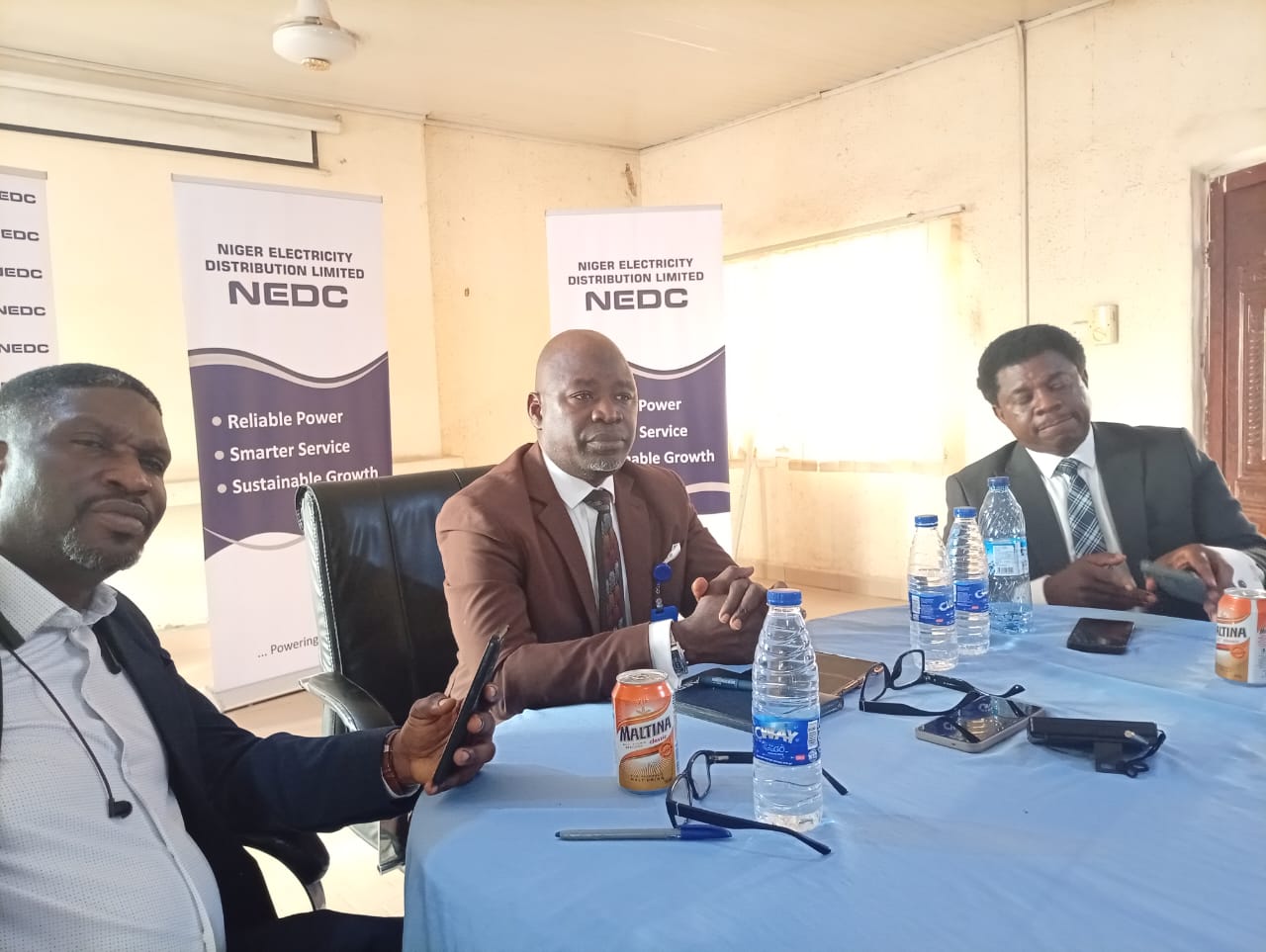
BY UTHMAN BABA-NASEER,MINNA
The Niger Electric Distribution Company Limited (NEDC) has announced plans to partner with journalists to improve development communication and increase public awareness of its activities and services.
The Managing Director of the company, Engineer Sam Odekina, made this known during a two-hour interactive session with journalists at his office.
He described the media as a key partner in progress, saying the company decided to work closely with journalists to better inform and educate the public about its operations, policies, and ongoing projects.
According to him, many electricity consumers want more information about the company’s activities. He explained that the media can serve as a reliable bridge between NEDC and its customers by providing accurate and timely information.
Engineer Odekina also described the media as the “fourth estate of the realm,” stressing its vital role in promoting transparency, accountability, and public understanding. He expressed confidence that the partnership would strengthen communication and build trust between the company and its customers.
In his remarks, the Head of Consumer Experience, Mr. Kene Ofili, appreciated the media for its contributions, noting that journalists have helped the company to properly inform and guide the public on important issues.
He appealed to journalists to always verify information with the company before broadcasting or publishing reports, to ensure accuracy and fairness.
Also speaking, the Head of Brand Marketing and Corporate Communication Mr. Omede Odekina assured journalists that the company would continue to share information about its challenges and activities so that the public can have a clearer understanding of its operations.
The interactive session highlighted the long-standing relationship between NEDC and the media and reaffirmed their commitment to working together in the interest of the public.
Politics
32 PAP Scholarship Beneficiaries Bag First Class *134 Graduate With Second-Class Upper Division *Excellent Academic Feats Impressive- Otuaro
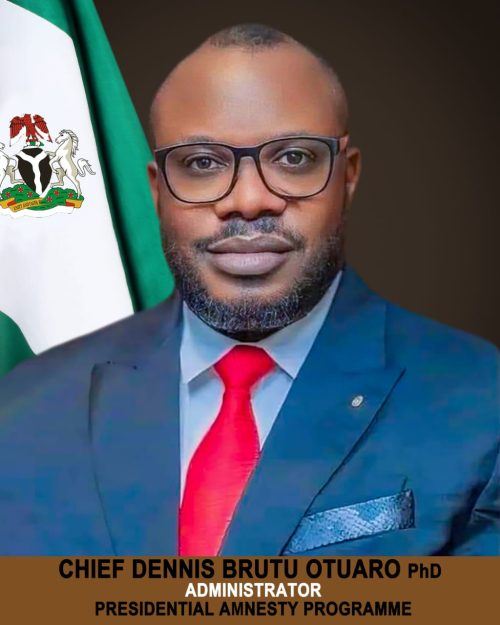
By David Owei,Bayelsa
Thirty-two students on the scholarship of the Presidential Amnesty Programme made first class in different competitive courses in 2025 at various universities in Nigeria.
No fewer than 134 of the scholarship beneficiaries also graduated with second-class upper division in various courses of study in the same year .
The courses are law, pharmacy, aeronautical engineering, cybersecurity, electrical engineering, software engineering, nursing science, mechanical engineering, architecture, accounting and criminology.
Others include computer science, anatomy, international relations and diplomacy, geography and regional planning, microbiology, public health, information technology, medical laboratory science, estate management and mass communication.
The PAP Administrator, Dr Dennis Brutu Otuaro, has commended the sponsored students under his leadership for graduating with first-class and second-class upper division grades in various disciplines.
He expressed joy over their outstanding academic performances, noting that his administration is greatly encouraged by their exemplary conduct and seriousness as shown by the quality of their academic grades.
Dr Otuaro said the scholarship beneficiaries’ excellent academic feats have formed part of the success stories of the programme in the promotion of human capital development and peace in the Niger Delta.
He stated that their sterling academic performances were a proof of the well-thought-out educational objectives of the scholarship scheme and the mandate of the PAP, stressing that it conforms with the Renewed Hope Agenda of President Bola Tinubu.
Dr Otuaro said that they had justified the investment in their education and also made the Federal Government, the PAP Office, their communities and the Niger Delta proud.
The PAP Administrator attributed the admirable academic achievements of the scholarship students to President Tinubu’s strong support for the programme and the effective supervisory role of the National Security Adviser, Mallam Nuhu Ribadu.
He called on current PAP scholarship beneficiaries in different universities to emulate their predecessors and study hard to maintain the impressive academic record.
Dr Otuaro said, “We are indeed happy with the excellent academic performances of our scholarship students in 2025. The number of beneficiaries, all from the Niger Delta, that made first-class and second-class upper division is very encouraging. We commend all of them for the great feats.
“But these commendable academic achievements indicate that we are focused on the implementation of the PAP mandate for the transformation of the Niger Delta through educational and vocational schemes.
“We express our deep appreciation to His Excellency, President Bola Ahmed Tinubu, GCFR. Without his strong support, these impressive academic feats of our scholarship students and all the success stories recorded would not have been achieved.
“We also extend our sincere gratitude to the Office of the National Security Adviser for effectively supervising the programme in line with Mr President’s Renewed Hope Agenda for the people of the Niger Delta.
“We have a listening father in Mr President who has shown it clearly in his actions that the Niger Delta is on his priority list of development. He has given priority to agencies in the region aside from the ongoing efforts in the construction of the trans-Niger Delta Highway from Lagos to Calabar.
“The people of the Niger Delta are happy with Mr President and what his administration is doing for the region, and will react in due course with the right expression of gratitude.”
Politics
Bayelsa Group Mulls Legal Actions Against Federal govt over 24 Additional LGAs,Resource Control
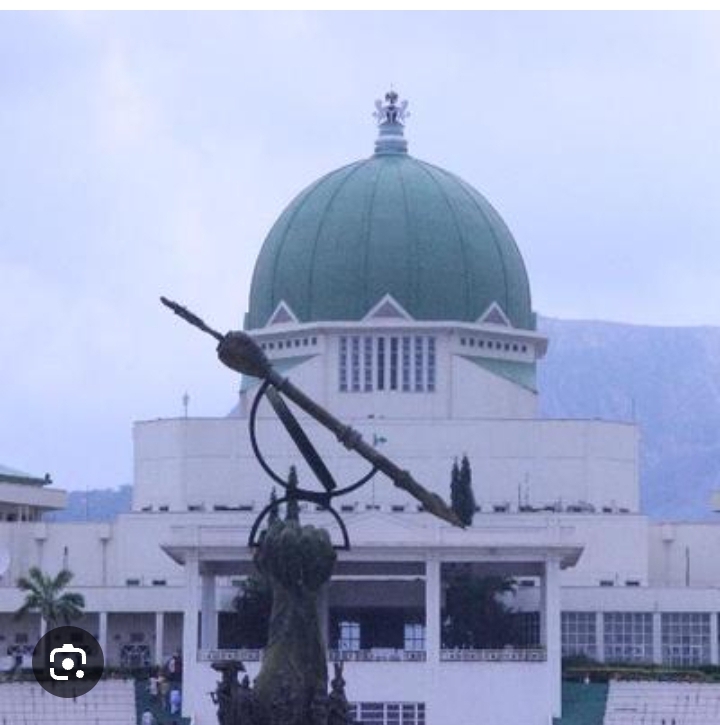
By David Owei,Bayelsa
A group under the aegis of Supreme Egbesu Assembly ( SEA ) has not only asked a law firm to sue the Federal government of Nigeria,that the National Assemblies over its failure to create or confirm the 24 additional local government areas of Bayelsa state,but has equally urged the federal government to revisit the 13% derivation principle,which they considered as lopsided and an affront on the state ,being a major oil producing state that has been contributing to the mainstay of the nation,s economy.
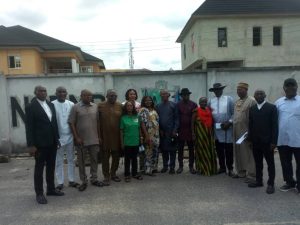
Failure to address these anomalies ,they will have no option other than to take legal actions against the federal government of Nigeria,with petitions sent to the clerk of House of Representatives and National Assembly.
The group made their grievances known in a press briefing at the Ernest Ikoli press centre ,Ekeki – Yenagoa.
According to the group,s Secretary,Dr Felix Tuodolo who was flanked by other members of the Supreme Egbesu Assembly, the national Assembly enacted the 1999 constitution which contained the provision of sections ,4,7 and 8 of the 1999 constitution as amended relating to the alteration of the 1999 constitution and creation of additional local government areas of Bayelsa state and that Bayelsa state was created a long side Eboyin ,Ekiti,Gombe,Nasarawa and Zamfara state,among states that were created in 1999,it’s only Bayels state that has the smallest number of local government with just eight local government areas.
That Nasarawa state for instance has 13 local government areas,Eboyin state has 13 local government areas, Gombe state has 24 local government areas,Zamfara state has 14 local government areas and Bayelsa state has 8 local government areas and that the creation of Bayelsa state with just 8 local government areas creates a clear imbalance both in governance and distribution of revenue allocation to states of the federation.
That the situation however informed the creation of additional 24 local government areas by the government of Bayelsa state duly to the gross injustice and the Bayelsa state House of Assembly in compliance with section 7 of the constitution of the federal republic of Nigeria 1999( as amended) approved and signed into law the said 24 local areas and since then all attempts to approve the 24 additional local government areas for Bayelsa state has proved abortive.
Speaking further,Dr Felix Tuodolo, the immediate past Commissioner for Ijaw National Affairs,posited that recently the National Assembly held it’s zonal constitutional conference for the proposed amendment of the 1999 and the Supreme Egbesu Assembly presented it’s position paper demanding for the creation of additional local government areas for Bayelsa state,and despite the continuous demand by the people of Bayelsa state ,the National Assembly has constantly refused to accede the sincere complains,hence they had contacted the services of E.K Okorodas and Co to sue the federal government.
The group also sued the Federal government of Nigeria,saying that the National Assembly enacted the 1999 constitution of the federal republic of Nigeria ,with the provisions of section 44(3) and section 1
62(2) relating to the acquisition ,revenue formula and distribution of revenues derived from natural resources from states in the federation and the said section 44 (3) of the 1999 constitution as amended gives ownership of entire property in and control of all minerals, mineral oils and gas in order or upon any land in Nigeria or in,under or upon any land in Nigeria or in,under or upon the territorial waters and exclusive economic zone of Nigeria to the Government of federation.
Other members of the group that added their voices were Mr Ebi Waribigha and Ms Primrose Oringeriya – Kpokopsei,decrying the injustices,marginalization that federal government has metted on Bayelsa state as far as the creation of additional local government areas and resource control were concerned.
Speaking to journalists earlier,Bar Ebinabo Kenneth Okorodas, in the interest of justice,they demand on behalf of their clients,that they cause an amendment of part 1 of the first schedule of the 1999 constitution to reflect the 24 additional local government areas of Bayelsa state and in the interest of justice,they also demand on behalf of their clients,that the National Assembly delete section 44 (3) and section 162 (2) of the 1999 constitution to reflect states control of her natural resources and pays an agreed percentage to the federal government in line with the spirit and letter of sovereignty,an failure to comply with this demand within 21 days from the date of such service of this notice shall result in commencement of legal proceedings without further notice.
-

 Politics6 months ago
Politics6 months agoASUU-NDU protest against FG loans, unpaid salaries,Non-Implementation of agreements …..says loans is generational slavery
-
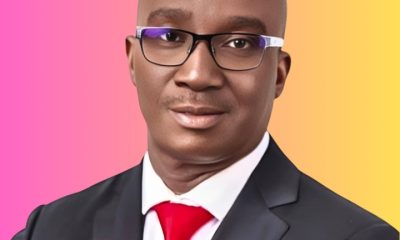
 Politics9 months ago
Politics9 months agoGov Okpebholo moves to end Cultism *Threatens action against leading cult groups *Vows to demolish more cult houses in Edo State
-

 Business & Economy6 months ago
Business & Economy6 months agoPC-NCG Issues Disclaimer on Purported Nigerian Coast Guard National Orientation Exercise In Anambra State
-

 Entertainment2 years ago
Entertainment2 years agoJubilation galore as Parishioners of CKC Kurudu celebrate their cultural heritage ….FG should exploit our Cultural heritage to unite Nigerians-Rev Fr Dim
-

 General News2 years ago
General News2 years agoReps hold public hearing on FMC Ugwuaji Awkunanaw
-

 General News2 years ago
General News2 years agoCelebration galore as UDA Successfully Elected New Exco ……I will digitalize processes that will raise UDA to greater height -Comr. Okejiri
-

 Law & Crime8 months ago
Law & Crime8 months agoICPC pledges to collaborate with FIDA to end Sex for Marks in tertiary institutions
-

 Law & Crime7 months ago
Law & Crime7 months agoLegal practitioner raises alarm over threat to his life by CSP Muhammed Abdulkareem



